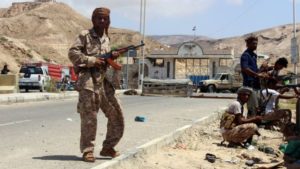by WorldTribune Staff, June 3, 2016
Yemeni government forces foiled an attempted terror attack by Al Qaida in the port city of Mukalla which the terror organization recently lost control of.
Security forces found an explosives-laden car that Al Qaida in the Arabian Peninsula (AQAP) was planning to blow up near an administrative headquarters in Mukalla, UAE state news agency WAM reported on June 2.

“We received intelligence about Al Qaida’s plans to launch a major terrorist attack in Mukalla aimed at destabilizing the city and creating panic among its residents,” the news agency quoted Gen. Faraj Salmin, commander of Yemen’s Second Military Zone in the eastern province of Hadramawt, as saying.
AQAP withdrew from Mukalla in April when government and Emirati soldiers entered the city, but not before the terror organization was able to amass a fortune through black market sales from the port, the country’s second largest.
UAE troops are providing operational assistance to Yemeni forces to rid Mukalla of remaining AQAP members.
Meanwhile, Iran-backed Houthi rebels have reportedly retaken ground from forces loyal to the government of President Abed Rabbo Mansour Hadi in the central provinces of Marib and Shabwa.
At least 85 fighters were killed and 100 wounded on both sides in three days of fighting, according to Yemeni officials.
Security officials, speaking on the condition of anonymity, said pro-government forces retreated due to lack of air support from the Arab coalition.
On June 2, airstrikes by the Saudi-led coalition hit a gathering of Houthis in the capital, Sanaa, killing five, security officials said.
A fuel ship sent by the UAE arrived in Yemen’s southern port city of Aden on June 2, local officials said.
The, said Yemen’s nearly 2-month-old cease-fire has improved humanitarian access but civilians are still facing an “immeasurable” crisis.
“The cease-fire has provided us an opportunity to get to areas we haven’t been able to get before,” Jamie McGoldrick, the UN’s humanitarian chief in Yemen, told AFP.
“The scale of the emergency is tremendous. The scale of the need is massive and the depth of the crisis is immeasurable,” he told reporters.
Government services and the health system were hardly functioning before the conflict and “the war has all but broken them completely,” McGoldrick said.
